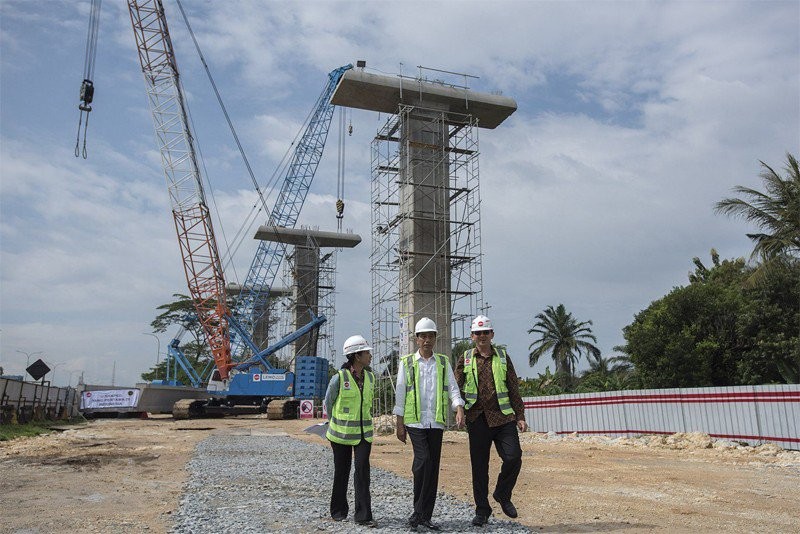Government to build more roads in border areas
Change Size
 President Joko "Jokowi" Widodo (center), along with State-Owned Enterprises Minister Rini Soemarno (left) and Jakarta Governor Basuki "Ahok" Tjahaja Purnama, inspects the progress of the light rail transit (LRT) project on Sep. 30 in Jakarta. (Antara/Widodo S. Jusuf)
President Joko "Jokowi" Widodo (center), along with State-Owned Enterprises Minister Rini Soemarno (left) and Jakarta Governor Basuki "Ahok" Tjahaja Purnama, inspects the progress of the light rail transit (LRT) project on Sep. 30 in Jakarta. (Antara/Widodo S. Jusuf)
T
he Public Works and Public Housing Ministry has vowed to focus state budget spending next year on road development in the country’s border areas to improve regional economic development in Kalimantan, Papua and East Nusa Tenggara (NTT).
The total budget allocated for roads in border areas doubled to Rp 2.76 trillion (US$212.3 million) next year from Rp 1.34 trillion this year, ministry data show.
Papua, for one, has seen its allocation for border area road construction more than double to Rp 734 billion (US$56 million) next year to leave the province with more than 900 kilometers of road.
“Each time we build roads, the economy will flourish there,” said the ministry’s director for road development, Rachman Arief.
The government considers road development in border areas a strategic goal to spur economic growth in an economy held back by a lack of infrastructure. It aims to build a total of 796 km of roads next year in border areas as well as along the southern coast of Java and in areas promoted for tourism, such as Lake Toba in North Sumatra.
All the road projects are expected to finish in 2018, except for those in NTT, where work is scheduled to conclude next year. A 177-km-long road is planned for East Nusa Tenggara, which shares a border with Timor Leste.
Rachman said that while budget allocations for border roads would definitely increase, efficiency measures would be brought forward, given the limited state budget.
For example, not all of the roads would be made of asphalt; some would use chip seal, a protective road layer on top of existing pavement. Roads made of asphalt would only be built near public houses and border gates.
“Our main target is to get the function. We will improve the quality over time,” he added.
The government is currently dealing with lower-than-anticipated state revenue that has forced it to conduct two budget cuts this year and affecting numerous ministries. The Public Works and Public Housing Ministry saw its budget for this year trimmed by a total of Rp 14 trillion to Rp 90 trillion.
The 4,235-km Trans-Papua is among the road projects strongly affected by the cuts, according to the ministry’s former director general, Bina Marga Hediyanto Husaini.
However, the government remains upbeat for overall road development, including for the 1,602-km road along the southern coast of Java, set to be partially funded by an Islamic Development Bank (IDB) loan.
The $250 million loan is slated to fund the construction of 159 km of road in the area and is expected to be disbursed by next year.
“For next year, at least Central Java has to be connected to Yogyakarta with the road,” Rachman said.
The road is deemed crucial to support underdevelopment airports in the area, including Kulon Progo airport in Yogyakarta.
Commenting on the plan to build more roads in border areas, Center for Reform in Economics (CORE) research director Mohammad Faisal urged the government to align infrastructure construction with the economic sectors to be developed in respective areas, so that the projects would not backfire to the community.
He warned that given already slow economic growth in border areas, road projects alone might just help bordering countries like Malaysia export their goods to Indonesia.
“It has to strengthen their most sought after sector, such as palm oil distribution in Kalimantan or also tourism,” he said, mentioning Lake Sentarum in West Kalimantan, which could be developed further with roads to the surrounding area.









